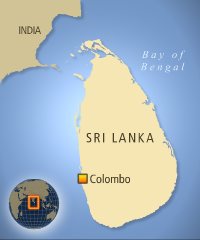Sri Lanka's coastal drinking water suffers of 2004 tsunami
Thousands of wells along Sri Lanka's coast remain unusable because of contamination caused by the Asian tsunami 17 months ago, a government official said, as international monitors urged new measures to tackle the problem.

S.R.J.R. Senanayake, an official at the state-run Water Supply Management Board, acknowledged Tuesday that a project to restore wells affected by the 10-meter (33-foot) high waves has so far failed.
"Initially, we thought that by flushing those wells, salinity could be pumped out," he told The Associated Press. "But it was not successful and salinity continues to prevail and people can't drink that water."
Some 40,000 wells, usually hand dug and relatively shallow, were destroyed or contaminated by the tsunami.
A 14-member international research team from the United States, Sri Lanka and Denmark found during investigations from February to September 2005 that the waves had affected coastal drinking water sources in several ways.
First, the tsunami itself, which reached up to 1.5 kilometers (0.9 miles) inland, poured sea water, along with other contaminants, directly into the open wells, rendering those that were not destroyed unusable.
Efforts to restore wells by pumping out sea water were sometimes apparently counterproductive, as excessive pumping may have allowed more sea water to enter the aquifer from below, the researchers wrote in a paper published in the American Geophysical Union journal Water Resources Research.
Second, in addition to direct contamination of wells, large quantities of sea water penetrated from the flooded surface of the land through porous layers below and into the aquifer, they said.
As a solution, Senanayake said the board had decided to provide pipe-borne water to all the affected areas.
The researchers, led by Prof. Tissa Illangasekare of the Center for Experimental Study of Subsurface Environmental Processes, located at the Colorado School of Mines, said that around the world, devastating floods can also be caused by storm surges, hurricanes or cyclones, and rising sea levels, reports the AP.
I.L.
Subscribe to Pravda.Ru Telegram channel, Facebook, RSS!


